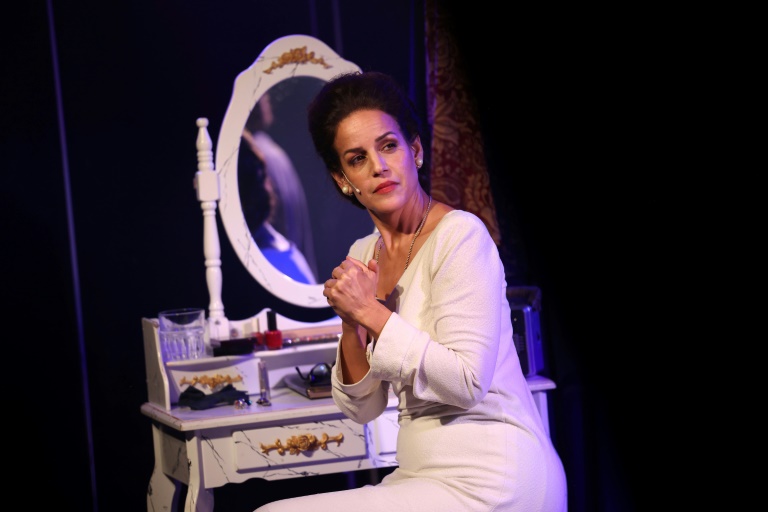Arab diva Umm Kalthoum helps Arabs, Jews to heal war wounds

Israeli actress Galit Giat plays Egyptian singer Umm Kalthoum at Jaffa Theatre
Jaffa – Love songs of Egyptian diva Umm Kalthoum boom across the Tel Aviv theatre where Arabs and Jews seek solace from the deadly Hamas-Israel war raging only miles away.
“On stage three Jews and three Arabs deliver their lines in Hebrew and sing in Arabic,” said play director Igal Ezraty.
“It is meant to show that Arabic is not just the language of Hamas,” whose militants launched a devastating attack on southern Israel in October triggering massive Israeli bombardment of the Gaza Strip.
Arabic “is a beautiful language… and for many Israelis it is the language of their childhood, the one their parents once spoke”, he said.
It’s the mother tongue of both Palestinian citizens of Israel and Jews who once lived in Arab countries.
The play “Umm Kalthoum” depicts the life of the Egyptian singer nicknamed “the lady” and the “star of the Orient” who captivated audiences across the Arab world and beyond during a 60-year career and even after her death in 1975.
Twice a month at the coastal Jaffa Theatre, Israeli actress Galit Giat plays Umm Kalthoum and sings her songs that include poems, while Arab musician Ala Abu Amara accompanies her on the oud.
But after Hamas militants pushed across the Israeli border on October 7, carrying out the deadliest attack since the country’s creation in 1948 and triggering Israel’s heaviest-ever bombardment of Gaza, the play was put on hold.
Israel says about 1,200 people, mostly civilians, were killed in the Hamas attacks.
In the Hamas-run Gaza Strip, where entire areas have been reduced to rubble, the health ministry says the war has killed more than 18,700 people, mostly women and children.
For about 90 minutes, the war is not on the minds of the Jaffa Theatre audience, where Jews, including men wearing the kippah, and Arabs let loose and enjoy the show.
For the artists on stage and the audience alike, this play is like “breathing”, said Giat, whose ancestors came to Israel from Algeria and Yemen.
“Umm Kalthoum is… home,” said the actress, who remembers visiting her grandparents as a child, with classical Egyptian songs filling their house.
“I would say to myself ‘why don’t you speak the language’,” she said.
– ‘Live, love, hate together’ –
Years later she has done just that and immersed herself in a role she describes as “a beautiful gift of life”.
“We play together, Christians, Muslims and Jews. We live together. We love together and we hate together,” she said.
Shaia, a member of the audience who only gave her first name, appears to agree.
“We are neighbours and I hope that peace will return and that we will not (have to) fight again,” she said, having bought her ticket well before October 7.
Shaia said she wanted to come to the show “to feel the connection between the two people” — Arabs and Jews.
None of the three Arab-Israeli actors, members of a community whose Palestinian ancestors remained on their land after Israel’s creation in 1948, wished to speak to AFP.
“It is tough for the Palestinians. They were all born here and once they try to speak they think they have done something wrong,” said Ezraty.
Sometimes, they are even “afraid to speak Arabic”, he added.
According to Ezraty, some have posted comments online “about the victims, about the war… and were arrested” by Israeli forces.
On stage, Umm Kalthoum is seen in her private home, wearing her trademark black-tinted glasses, surrounded by her mother, her songwriter, a rival, a belly dancer.
The singer was born into poverty but grew to become close to influential political leaders thanks to a powerful voice that left her audience spellbound, regionally and in the West.
Bob Dylan said he admired her while Beyonce once danced to the lyrics of one of the diva’s greatest songs, “Enta Omri” (“You are my life” in Arabic).
As the play ends, images are broadcast on a screen of Umm Kalthoum’s funeral in Cairo which was attended by millions of grieving fans.
